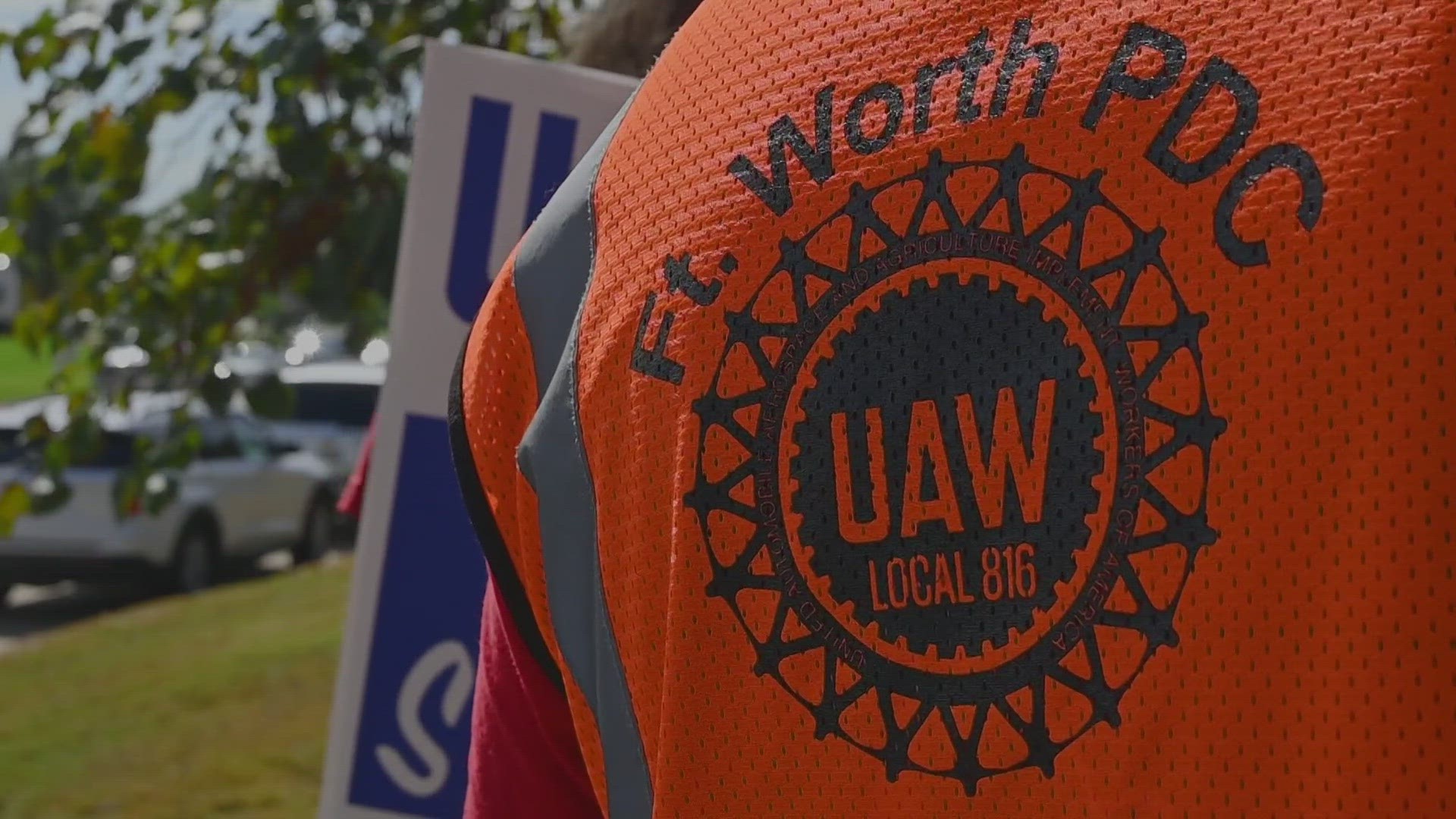DALLAS — The president of the United Auto Workers said Friday that the union will expand its strike against major automakers by walking out of 38 General Motors and Stellantis plants in 20 states, including ones in North Texas.
The Fort Worth parts distribution GM plant in Roanoke and the Dallas Stellantis plant in Carrollton were both on the list of plants that were planning to go on strike at 11 a.m.
The GM plant in Arlington was not included on the list.
Ford was spared additional strikes because the company has met some of the union’s demands during negotiations over the past week, said UAW President Shawn Fain.
The union is pointing to the companies’ huge recent profits as it seeks wage increases of 36% over four years. The companies have offered a little over half that amount. The UAW has other demands, too, including a 32-hour work week for 40 hours of pay, and a restoration of traditional pension plans for newer workers.
UAW 2360 President Cleo Wynn told WFAA he's not sure how long workers will maintain the strike.
"We’re only striking because we just want our fair share, so this is a sacrifice that we’re making," Wynn said. "We want the company to be profitable, but we also just want some of that profit."
The companies say they can’t afford to meet the union’s demands because they need to invest profits in a costly transition from gas-powered cars to electric vehicles.
Melissa King, who has worked at the Dallas Stellantis plant in Carrollton for more than a decade, joined the strike Friday morning.
"It's kind nerve-wrecking," King said. "You're kind of taking a leap of faith. I've worked here 12 years, and I've already had a neck surgery and one on the way. We give our lives, families, our bodies to this place, and we all go home limping."
King's coworker, Ariana Josiah-Moore, said she and her coworkers are not currently paid a livable wage. Josiah-Moore, who lives with her mother, said she's unable to afford an apartment on her own under her current pay. For the time being, employees are receiving strike pay, which is significantly lower than their normal earnings.
"We had to to what we had to do," Josiah-Moore said. "I hope we can come to an agreement."
Cornelius Lincoln, President of UAW 816 at the Roanoke location, said he and other union workers felt a sense of excitement when the international union group called on the to strike.
"It's our turn, so now it's time to show we're all in support," Lincoln said.
Adam Martinez, a member of UAW 816, said he gets paid more than the worker next to him, despite doing the same kind and amount of work. He calls it unfair.
"You think about what it costs to feed a family, and $17 an hour just doesn't do it," Martinez said.
Tylan Loston, who's approaching on a year of employment at the Fort Worth GM distribution center, said he is fighting for and with his union colleagues. He called it fighting for something "bigger than themselves."
"We're fighting for something good, fighting for the workers," Loston said. "They say, 'Record contracts because [GM] made record profits.'"
The UAW’s contract with the automakers expired at midnight on Sept. 14, at which point workers walked out of a Ford assembly plant near Detroit, plus a GM factory in Wentzville, Missouri, and a Jeep plant run by Stellantis in Toledo, Ohio.
The initial strike involved about 13,000 of the union’s 146,000 members.
Dr. Ashish Sedai, a researcher and assistant professor of economics at the University of Texas at Arlington, called the protests "strategic."
"The companies -- GM,Ford, Stellantis -- are also surprised because they don't know where the strike is gonna happen next," Dr. Sadis said. "Everything is livestreamed on that day."
Car lots and retailers around the country, including in North Texas, have not felt the impact of the strikes -- yet. But Dr. Sedai said that, the longer the strikes continue, the higher the economic cost will soar.
"The strike, in 10 days, will cost $5 billion," said Dr. Sedai. "Suppose is goes on for 20 days... The negative impact would not simply be five more billion to $10 billion. We are looking at a non-linear affect moving forward."
UAW workers WFAA spoke with said they know this, and hope that, because of it, "the big three" comes to the table soon.

